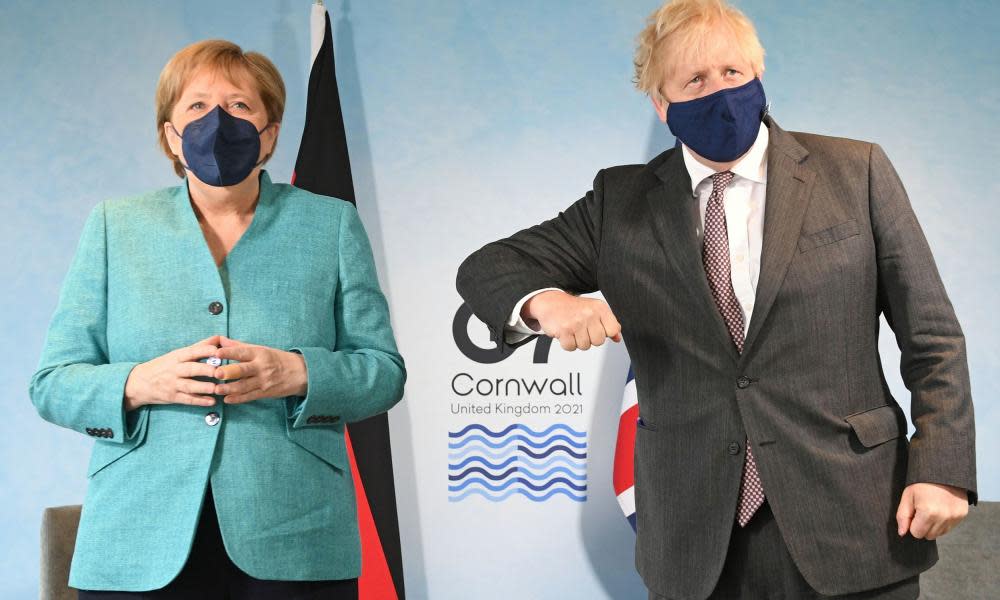‘Mistrusted’ Johnson feels full force of EU fury as Brexit wrecks G7 summit

The setting is a small English village on the Cornish coast, but the message that Boris Johnson wants projected from the beachside summit in Carbis Bay is one of big British influence across the globe.
The three-day G7 meeting of world leaders, which ends on Sunday, was identified months ago by the prime minister as the moment to launch his vision of a confident post-Brexit “global Britain”.
The UK, newly independent and sovereign, would show itself to be anything but diminished, having wrested itself free of Brussels.
On the contrary, it would boldly lead initiatives on arguably the two greatest global challenges of our times: the battle to vaccinate the world against Covid-19, and the fight to save it from the destructive effects of the climate crisis. There would be other issues, too, for the UK hosts to show off their leadership abilities, including efforts to devise a new G7 strategy towards China, and rallying more support for girls’ education in developing nations.
But after two full days of seaside photo-ops and largely pre-cooked announcements, including a new US-UK Atlantic charter modelled on the historic statement made by Churchill and Roosevelt on the postwar world order, one narrow, familiar and hugely dangerous issue was overshadowing progress elsewhere: Brexit.
Unhappiness at the UK’s attitude to Brexit and its potential effect on the Good Friday agreement was undermining Johnson’s summit power plays and his relations with fellow G7 leaders. Tensions over the Northern Ireland issue were preoccupying Joe Biden at his first G7 as US president and causing real anger in the French and German delegations.

The reason for much of the EU’s irritation was a feeling that the UK under Johnson simply could not be trusted. Throughout recent weeks, and on Saturday, the prime minister made it clear he would be prepared to unilaterally delay the full implementation of the Northern Ireland protocol – part of the Brexit withdrawal agreement – in order to prevent a ban on some foodstuffs, including sausages, crossing the Irish Sea from Great Britain.
Restrictions on British-produced chilled meats entering Northern Ireland are due to come into force at the end of this month as part of Brexit deals struck (and much hailed by the prime minister at the time) with the EU to protect its single market.
On Saturday in a “triple whammy” of meetings, beginning at 8am with Macron, Merkel and then European Commission President Ursula von der Leyen and European council president Charles Michel, the Europeans’ fury at Johnson for going back on treaty deal became clear. Their annoyance is unlikely to have been lifted by the presence at all the meetings of Lord Frost, the UK’s chief Brexit negotiator, who was wearing union jack socks. Biden had made his views on the threat to the Good Friday agreement known in no uncertain terms before the summit began, issuing orders to the UK side to sort the matter out quickly, through compromise.

At his meeting with the PM, Macron told Johnson, according to well-placed summit sources, that Franco-British relations could only be “reset” if he stood by the Brexit divorce deal he had signed with the EU. “The president told Boris Johnson there needed to be a reset of the Franco-British relationship. This can happen provided that he keeps his word with the Europeans,” the source said. For his part Johnson accuses the EU of being inflexible and “purist” over the legally binding agreements.
Foreign policy experts and former British diplomats said that while the summit may have its successes on advancing initiatives on climate change and vaccinations for developing countries, it had also shown the UK to be distrusted and therefore unable to be a true global leader. Sir Nigel Sheinwald, a former UK ambassador to Washington, said: “The lesson of this week is that you can’t have a global Britain which is genuinely respected and influential and impactful around the world if people doubt your basic bona fides. There is no point in writing new Atlantic charters which depend on mutual trust, mutual confidence and the rule of law when you are operating as chancers.”
Sheinwald added that Biden would now be expecting Johnson to solve the Northern Ireland impasse with the EU. “After making the stand they did, the Americans will know that they will look rather ineffective if a negotiated settlement to this is not found, so the stakes are quite high.”
Lord Peter Ricketts, a former permanent secretary at the Foreign Office and also an ex-UK ambassador to France, said Johnson was finding out that it was not possible to have good bilateral relations with France and Germany while treating the EU like an enemy.
“We have haemorraghed and squandered trust,” said Ricketts. “They announced the new Atlantic charter two days ago which has bold lines about sustaining international law and the norms of standards and international cooperation, that we will uphold the rules based order, and then we threaten to walk away from a deal that we signed 18 months ago, so there is a total lack of coherence there which I think people sense.
“In these bilaterals with Macron and Merkel – rather than thrashing out a policy on China which is in our and Biden’s own interests – instead leaders are distracted by having to make these polemical points about Europe.”
Another former UK ambassador to Washington and the EU, Kim Darroch, said that Johnson had failed in his big ambition for the summit: “An international agreement is not an a la carte menu from which you can choose what you like and ignore the rest. Once you sign off on it you have to implement it properly and fully. Global Britain is not going to work unless we are seen to live up to our commitments.”

 Yahoo News
Yahoo News 
